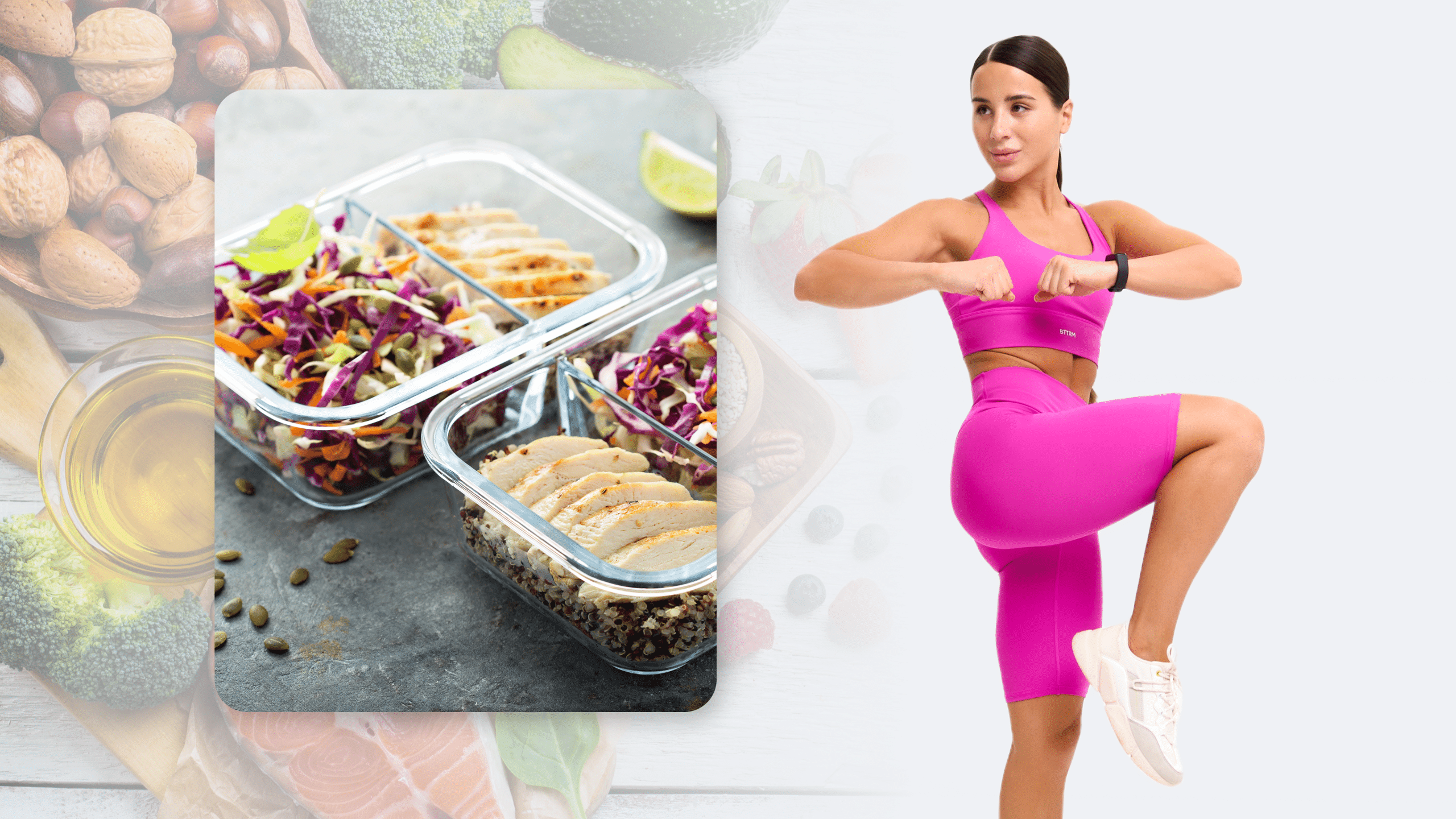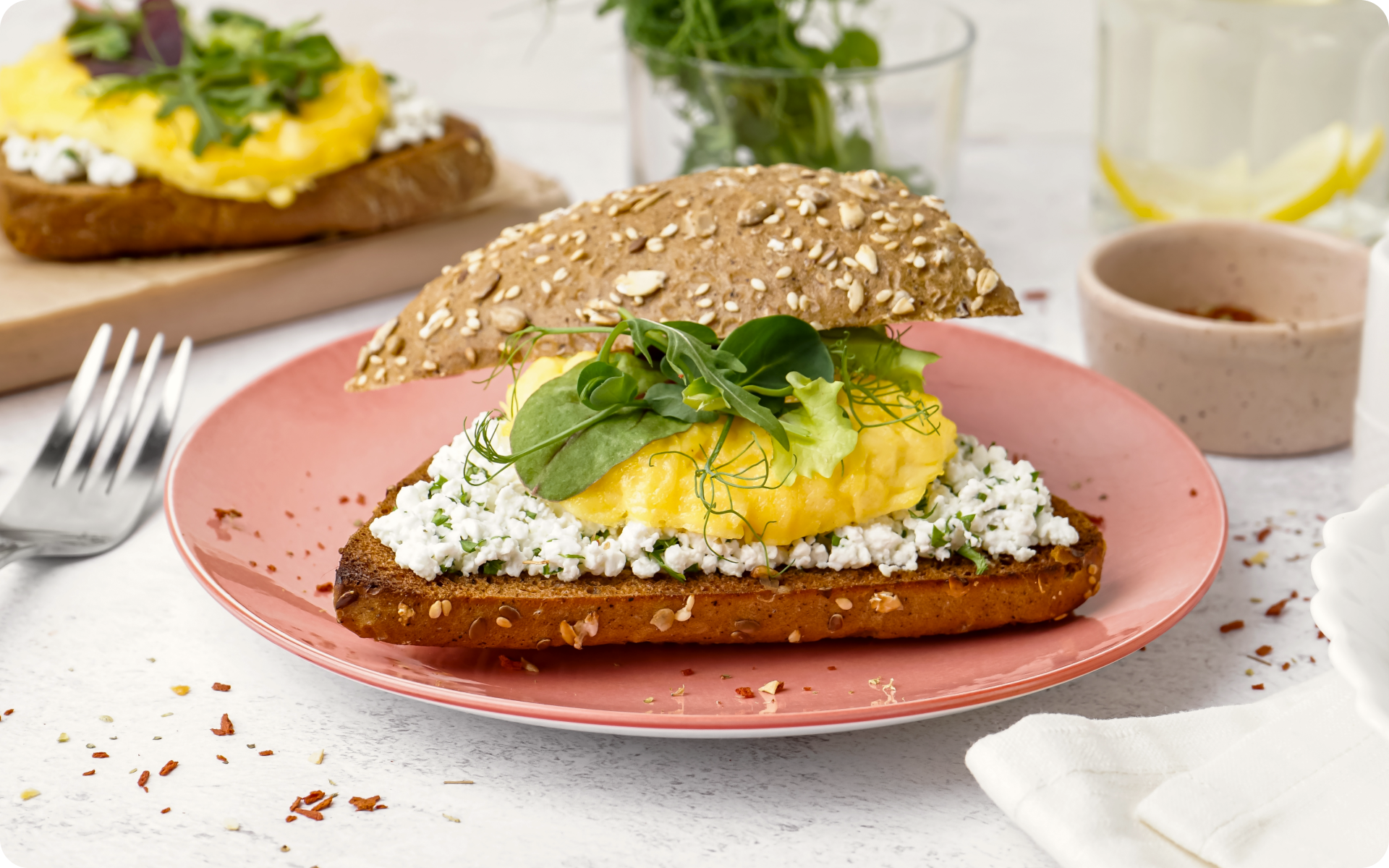Bulking is the process of eating more calories than you burn in order to gain weight and build muscle. The goal of clean bulking is to minimize fat gain while maximizing muscle growth. This can be accomplished by following a healthy balanced diet and exercise plan.
What Is Clean Bulking?
Clean bulking is a term that is used to describe the process of building muscle while minimizing fat gain. It involves consuming a slight calorie surplus, usually around 5-10% above your maintenance level, to support muscle growth without excessive fat gain.
Clean bulking is important for several reasons. Firstly, it aims for more sustainable progress toward building muscle. By minimizing fat gain, you can avoid the common problem of having to go through frequent cycles of cutting and bulking, which can be taxing on the body both physically and mentally.
Furthermore, clean bulking also aims for better body composition. By keeping your calorie surplus small and focusing on nutrient-dense foods, you’re more likely to build lean muscle mass than excess body fat. This can help you achieve a more toned and defined physique.
To clean bulk effectively, you should focus on the quality of your food choices. This means opting for whole, nutrient-dense foods such as lean proteins, complex carbohydrates, and healthy fats. These foods will provide your body with the necessary nutrients to support muscle growth while minimizing fat gain (1).
Track your calorie intake and make sure you’re consuming a slight surplus rather than just eating as much as possible. This will prevent excessive fat gain and allow for more controlled progress. In addition, make sure to prioritize resistance training and aim for progressive overload in your workouts to stimulate muscle growth.
While clean bulking may not result in rapid weight gain like traditional bulking methods, it’s a more sustainable and healthier approach. It allows for gradual progress while still supporting muscle growth and overall body composition.
What Are Good Foods for Clean Bulking?
A clean bulk diet should consist of mainly whole, minimally processed foods such as lean meats, vegetables, fruits, whole grains, legumes, and healthy fats. You should also make sure you consume enough protein and calories to support muscle growth (3).
Why Lean Meats?
Protein is one of the most important nutrients for building muscle. Lean meats are an excellent source of high-quality protein. They also contain other nutrients such as amino acids and iron that are essential for muscle growth (4).
Most importantly, this type of meat is relatively low in fat. This is important as too much dietary fat can contribute a lot of calories and lead to fat gain (4). It is also recommended to limit the saturated fat that is found in animal products for better heart health
Some lean meats to include in your diet are:
- Chicken
- Turkey
- Fish
- Lean beef
- Pork
Why Vegetables?
Vegetables are an important part of a clean bulk diet for several reasons. Firstly, they’re a great source of vitamins and minerals. It’s impossible to build muscle without these nutrients.
Vegetables are also low in calories and high in fiber. This combination can help you feel full and satisfied after meals, which prevents overeating. In addition, fiber helps regulate digestion and can promote a healthy gut (6).
Some great vegetables to include in your diet are:
- Spinach
- Broccoli
- Kale
- Cauliflower
- Sweet potatoes
- Peppers
Snack on Fruits
Fruits are an excellent source of vitamins, minerals, and antioxidants. These nutrients are important for overall health and can help reduce inflammation (6).
As with vegetables, fruits are low in calories and high in fiber. This makes them a great choice for snacks or additions to meals (6).
Some healthy fruits to include in your diet are:
- Berries
- Apples
- Oranges
- Pears
- Grapes
BetterMe app will kick you out of the mental funk, shake off your extra weight, rid you off your energy-zapping habits, and help you sculpt the body of your dreams. Intrigued? Hurry up and change your life for the better!
Why You Shouldn’t Avoid Carbs
During the bulking phase, you’re expected to go hard on your workouts. Lift heavy, as this is the only way you’ll build more muscle. Carbs are an important fuel source for your muscles. They help you perform better during workouts and promote muscle growth (4).
So, don’t be afraid to include healthy complex carbs in your diet. Just make sure they mostly come from whole, unrefined sources such as whole grains, beans and legumes, starchy vegetables, and fruit.
Why You Shouldn’t Avoid Healthy Fats
Fat is an essential nutrient our bodies need for various functions. That being said, not all fats are created equal.
The type of fat you eat is more important than the amount. You should focus on consuming healthy fats such as omega-3s and other poly- and monounsaturated fats. These types of fat can help improve heart health, lower cholesterol, and reduce inflammation (2).
Some good sources of healthy fats include:
- Olives
- Avocados
- Nuts
- Seeds
- Fish
- Flaxseed oil
- Extra virgin olive oil
How Many Calories Should I Eat?
The number of calories you need to eat is dependent on several factors, including age, weight, activity level, and muscle-building goals.
A general guideline is to eat 18-20 calories per pound of body weight if you’re trying to build muscle. So, if you weigh 180 pounds, you need to consume 3,240-3,600 calories per day (4).
It’s also important to make sure you get enough protein. A general recommendation is to consume 0.7-1 grams of protein per pound of body weight. So, if you weigh 180 pounds, you need to eat 126-180 grams of protein per day (4).
These are just general estimates – you may need to experiment a little to figure out what works for you.
How Many Meals a Day to Clean Bulk?
While you’re clean bulking, you may eat as many or as few meals as you wish, as long as your total calorie and nutrient intake remains in line with your goals. Some individuals may find it easier to consume a slight calorie surplus by spreading their meals out throughout the day, while others may prefer larger, less frequent meals.
One important factor you should consider when determining meal frequency during clean bulking is protein distribution. It’s recommended to spread protein intake evenly throughout the day, consuming around 20-30 grams of protein per meal. This helps ensure your body is constantly supplied with the necessary building blocks for muscle growth.
Another consideration is meal timing in relation to workouts. It’s generally recommended to consume a meal that contains carbohydrates and protein 1-2 hours before and after your workout to support muscle repair and growth.
The most important aspect of clean bulking is meeting your daily calorie and nutrient needs, rather than strict adherence to a specific meal frequency. Your best bet is to experiment and find what works best for your personal preferences and schedule.
Read more: A Beginner Intermittent Fasting Meal Plan To Fit Your IF Journey
What Should I Avoid When Clean Bulking?
When clean bulking, you should limit ultra-processed foods, sugary drinks, and unhealthy fats. These types of foods can contribute to fat gain and don’t necessarily help build muscle.
You should also avoid excessive amounts of alcohol. While a small amount of alcohol won’t hurt, too much can lead to fat gain and can make it more difficult to meet your exercise goals if you aren’t feeling your best after a night of drinking.
7-Day Clean Bulking Diet Meal Plan
Here’s an example of a clean bulking meal plan that can help you build lean muscle mass. Portion sizes can be adjusted to fit your individual needs.
Day One
- Breakfast: 6-egg omelet with vegetables, 1 slice whole-wheat toast, 1 cup Greek yogurt
- Morning snack: Apple with peanut butter
- Lunch: Chicken breast, salsa, brown rice, and peppers
- Afternoon snack: Cup of mixed nuts
- Dinner: Tuna steak with olive oil, two sweet potatoes, and quinoa
Day Two
- Breakfast: Protein smoothie with banana, oats, almond milk, and protein powder
- Morning snack: Protein bar
- Lunch: Turkey sandwich on whole-wheat bread, carrots, and grapes
- Afternoon snack: Beef jerky
- Dinner: Salmon, broccoli, brown rice, and avocado
Day Three
- Breakfast: Large portion of granola, whole milk, and sliced banana
- Morning snack: Protein shake
- Lunch: Double chicken breast, broccoli, and rice
- Afternoon snack: Apple with peanut butter
- Dinner: Tuna, pasta and Bolognese sauce
Day Four
- Breakfast: Oatmeal with blueberries and whole milk
- Morning snack: String cheese
- Lunch: Chicken salad with olive oil and vinegar dressing
- Afternoon snack: Hard-boiled eggs
- Dinner: Ground beef patty, sweet potato, and salad
Day Five
- Breakfast: Protein pancakes with syrup
- Morning snack: Greek yogurt
- Lunch: Grilled chicken, quinoa, and roasted vegetables
- Afternoon snack: Protein shake
- Dinner: Salmon, wild rice, and steamed vegetables
Day Six
- Breakfast: Scrambled eggs with vegetables, whole-wheat toast, and fruit
- Morning snack: Mixed nuts
- Lunch: Turkey wrap with avocado, lettuce, and tomato
- Afternoon snack: Banana with peanut butter
- Dinner: Grilled steak, baked potato, and sautéed vegetables
Day Seven
- Breakfast: Omelet with vegetables and cheese, whole-wheat toast, and fruit
- Morning snack: Protein shake
- Lunch: Chicken burrito bowl with rice, black beans, lettuce, and tomato
- Afternoon snack: Carrots and hummus
- Dinner: Burger with lean beef, fries, white bread roll, cup of green beans
Lean and toned up body isn’t just a far-fetched fantasy. Check out the BetterMe app and watch it propel your weight loss journey into high gear!
Sample Clean Bulking Shopping List
Here’s a list of groceries you may need to purchase in order to follow the clean bulk diet plan (1):
Protein
Chicken breasts (boneless skinless), lean ground beef, salmon, tuna, turkey breast, beef jerky, Greek yogurt, cottage cheese, protein powder, and protein bars.
Carbs
Oats, quinoa, brown rice, wild rice, whole-wheat bread, whole-wheat pasta, sweet and regular potatoes, beans and lentils.
Fruits and vegetables
Apples, bananas, berries, carrots, celery, grapes, lettuce, tomatoes, broccoli, Brussels sprouts, cabbage, cauliflower, and green beans.
Healthy fats
Avocados, olive oil, nut butters, and salad dressing.
What Are the Benefits of Clean Bulking?
There are several benefits that may come with clean bulking, including:
Less Fat Gain
Years ago, bodybuilders would do a “dirty” bulk where they would eat anything and everything in order to gain weight. This often led to them gaining a lot of fat together with muscle. Clean bulking helps you avoid this by following a healthy diet plan that’s balanced and nutrient-dense.
More Muscle Gain
When you clean bulk, you minimize fat gain and maximize muscle growth. This is because you’re eating the right foods and getting enough high-quality protein and calories to support muscle growth (3).
Improved Performance
As clean bulking should help you gain more muscle and less fat, it may also lead to improved physical performance (13). This is particularly beneficial for athletes who need to be strong and lean.
Better Overall Health
When you clean bulk, you’re eating healthy foods that provide your body with the nutrients it needs. This leads to better overall health and helps reduce the risk of developing chronic diseases (4).
What Are the Downsides of Clean Bulking?
There are a few downsides to clean bulking, including:
Takes More Time
Clean bulking may take more time than dirty bulking because you need to be more careful about what you eat. This can be tedious for some people and may lead them to cheat or give up.
May Not See Results as Quickly
As you’re not eating as much and gaining less fat, you may not see results as quickly as you would with dirty bulking. This can be discouraging for some people who want to see fast results.
Read more: Vegan Weight Loss Meal Plan and Prep Tips
How to Clean Bulk
Now that you know what clean bulking is and the benefits and downsides of it, here’s how to do it:
Eat Enough Calories
The first step to clean bulking is eating enough calories. You need to eat enough to support muscle growth, but not so much that you gain a lot of fat (8). A good rule of thumb is to eat around 300-500 calories more than your maintenance level.
Get Enough Protein
Protein is essential for muscle growth, so make sure you get enough. Aim for around 0.7-1 gram of protein per pound of body weight per day (4).
Eat Healthy Carbs
Carbs are important for energy and muscle growth, so you need to make sure you eat healthy complex ones (12). Good sources of carbs include starchy vegetables, whole grains, and beans and legumes.
Eat Healthy Fats
Fats are important for hormone production and other functions, so you need to make sure you eat healthy ones (5). Good sources of healthy fats include avocados, olive oil, fish, and nuts.
Avoid Junk Food
Junk food is high in calories but low in nutrients, so it’s best to limit or avoid it when you’re clean bulking. This includes foods such as chips, cookies, cake, and candy.
Have a Cheat Day
One of the best things about clean bulking is that you can have a cheat day. This allows you to enjoy your favorite foods while still making progress. Just make sure you don’t overdo it and eat too much junk food.
Reduce Calories Slightly on Non-Training Days
On days where you don’t workout, you don’t need as many calories. So, you should reduce your calorie intake by about 200-300 calories on these days.
The reason why you should do this is because it will help you avoid gaining too much fat.
Lift Heavy Weights
Lifting heavy weights is essential for muscle growth. It works by causing microscopic tears in your muscles, which your body then repairs and strengthens (9).
Lifting heavy can mean anything from 85-95% of your one-rep max.
Get Enough Rest
A heavy lifting schedule is not effective without enough rest (10). This is because your muscles need time to repair and grow.
Aim for 8 hours of sleep every night and take a nap during the day if possible (11). Make sure you work in rest days between your strength training sessions.
Take Supplements
Supplements can help you reach your goals by providing you with extra nutrients. They’re not necessary, but they can be helpful, particularly if you’re having trouble getting enough of certain nutrients from food.
Some good supplements to take for clean bulking include protein powder, creatine, and omega-3s.
Drink Plenty of Water
Water is important for many functions in your body, including muscle growth. When you’re clean bulking, make sure you drink plenty of water. A good rule of thumb is to drink 0.5 ounces per pound body weight (4). You may need extra on days when the weather is hot or you do a more intense workout.
Eat Often
Another way to make sure you get enough calories and nutrients is to eat often. This doesn’t mean you need to eat 6-7 meals a day, but eating 4-5 meals spaced evenly throughout the day can be helpful.
Track Your Progress
The best way to know if you’re making progress is to track it. Every week, weigh yourself and take measurements of your chest, waist, hips, and thighs. This will help you see how much muscle you’ve gained and how much fat you’ve lost.
Be Patient
Building muscle takes time, so you must be patient. Don’t expect to see results overnight; it takes months of consistent training and eating to see significant changes.
Your body also needs time to adjust to the new workout routine and diet.
There will be times when it feels as if you’re not making any progress. This is normal, and it happens to everyone. The important thing is to keep going and never give up.
If you stick with it, you’ll ultimately see the results you want.
FAQs
Is 2,900 calories enough to bulk?
2,900 calories may be enough to bulk for some people, depending on their individual calorie needs and activity level. How many calories you need to consume to bulk will vary based on factors such as age, sex, height, weight, and physical activity level.
It’s recommended to start with a slight calorie surplus of 5-10% above your maintenance level and adjust from there based on your progress. This may mean increasing or decreasing your calorie intake depending on whether you’re gaining muscle and strength.
Tracking your calorie intake and progress is important to determine if 2,900 calories is enough for you to bulk. If you’re not seeing the desired results, it may be necessary to adjust your calorie intake accordingly. Consulting a dietitian or fitness professional can also be helpful to determine the right calorie intake for your goals.
Is rice good for a bulk?
Yes, rice can be a beneficial food to include in your clean bulk. It’s a complex carbohydrate that provides energy for your workouts and helps with muscle recovery and growth. It also contains essential vitamins and minerals such as B vitamins, magnesium, and selenium (7).
Brown rice is considered the whole-grain option as it contains more fiber, vitamins, and minerals than white rice. However, the differences in fiber are minor, and some white rice is fortified with vitamins and minerals.
Other rice varieties such as wild rice, black rice, and red rice also offer various nutritional benefits and can be incorporated into a clean bulking diet. For example, wild rice is higher in protein and fiber, whereas black rice is rich in antioxidants (7).
When you incorporate rice into your clean bulk diet, choose whatever type you prefer or is accessible to you in appropriate portion sizes to meet your calorie and nutrient needs. Pairing rice with lean protein sources, vegetables, and healthy fats can create a well-rounded and nutritious meal.
Can you have a cheat day on a clean bulk?
You can have a cheat day on a clean bulk, provided you understand that moderation is very important. Even though you want to stick to a clean diet most of the time, allowing yourself occasional treats or cheat meals can help prevent burnout and make the process more enjoyable.
However, it’s important to keep in mind that a cheat day should not turn into a binge-eating session. For example, rather than eating a whole pizza, eat just a few slices and pair it with a side salad for balance. In addition, try to keep cheat meals within your designated calorie surplus to avoid excessive fat gain.
If you’re struggling to moderate cheat meals, your diet may be too restrictive. Try loosening the rules and find ways to incorporate your favorite foods into your everyday routine in a balanced and moderate way, rather than cycling between strict dieting and “cheating.”
Can I eat junk on a clean bulk?
You shouldn’t eat junk on a clean bulk; it defeats the purpose of clean bulking. The goal of clean bulking is to support muscle growth and overall health, which means consuming nutrient-dense foods that provide the necessary vitamins, minerals, and macronutrients.
While it’s okay to have occasional treats in moderation, filling your diet with mostly ultra-processed and unhealthy foods can lead to negative effects on both physical performance and overall well-being. These foods often lack essential nutrients and can contribute to fat gain, inflammation, and other health issues (14).
Instead, you should focus on incorporating whole, nutrient-dense foods such as lean protein sources, complex carbohydrates, healthy fats, fruits, and vegetables into your diet. This will support your clean bulk and promote optimal health and wellness.
Homemade versions of your favorite “junk” foods can also be a healthier option. For example, making homemade pizza with whole-wheat crust and lean protein toppings or baking your own lower-sugar desserts. This will enable you to satisfy your cravings while still sticking to your clean bulk goals.
The Bottom Line
Bulking up and gaining muscle mass takes time, effort, and patience. However, if you follow the above clean bulking tips, you’ll be on your way to building the lean and muscular physique you desire.
Just remember to stay disciplined with your diet and training, and don’t get discouraged if you don’t see results immediately.
DISCLAIMER:
This article is intended for general informational purposes only and does not serve to address individual circumstances. It is not a substitute for professional advice or help and should not be relied on for making any kind of decision-making. Any action taken as a direct or indirect result of the information in this article is entirely at your own risk and is your sole responsibility.
BetterMe, its content staff, and its medical advisors accept no responsibility for inaccuracies, errors, misstatements, inconsistencies, or omissions and specifically disclaim any liability, loss or risk, personal, professional or otherwise, which may be incurred as a consequence, directly or indirectly, of the use and/or application of any content.
You should always seek the advice of your physician or other qualified health provider with any questions you may have regarding a medical condition or your specific situation. Never disregard professional medical advice or delay seeking it because of BetterMe content. If you suspect or think you may have a medical emergency, call your doctor.
SOURCES
- 30 muscle-building foods to fuel your goals (2021,medicalnewstoday.com)
- A healthy approach to dietary fats: understanding the science and taking action to reduce consumer confusion (2017, nih.gov)
- Dietary Protein and Muscle Mass: Translating Science to Application and Health Benefit (2019,nih.gov)
- Evidence-based recommendations for natural bodybuilding contest preparation: nutrition and supplementation (2014, nih.gov)
- FAT REQUIREMENTS FOR OPTIMAL HORMONAL HEALTH (2022,cleanhealth.edu.au)
- Health Benefits of Fruits and Vegetables (2012, nih.gov)
- Health Benefits of Rice (2022,webmd.com)
- Is an Energy Surplus Required to Maximize Skeletal Muscle Hypertrophy Associated With Resistance Training (2019,nih.gov)
- Progression of volume load and muscular adaptation during resistance exercise (2014,nih.gov)
- Relationship between sleep and muscle strength among Chinese university students: a cross-sectional study (2017,nih.gov)
- Sleeping hours: what is the ideal number and how does age impact this? (2018, nih.gov)
- The Effect of Carbohydrate Intake on Strength and Resistance Training Performance: A Systematic Review (2022,nih.gov)
- The Importance of Muscular Strength in Athletic Performance (2016,nih.gov)
- The Hidden Dangers of Fast and Processed Food* (2018,nih.gov)













